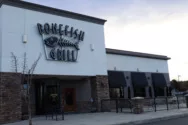
Home » Land buy may open door to tribal casino
Land buy may open door to tribal casino

July 15, 2019
The Colville Tribes’ $10.8 million purchase of 184 acres of
Franklin County farmland could set the stage for a future casino just northeast
of King City in Pasco.
Though opening a
casino would take “many years” since the land off Highway 395 would first need
to be transferred into federal trust status through the Bureau of Indian
Affairs or the U.S. Department of the Interior, said Rodney Cawston, chairman
of the business council for the Confederated Tribes of the Colville
Reservation.
“That can take some
time,” he said. “And then afterwards we apply for the permit for the casino,
and that can take some time as well.”
The tribes own and
operate three other casinos: 12 Tribes Resort Casino in Omak, Mill Bay Casino
in Manson and Coulee Dam Casino in Coulee Dam.
Though a casino
project is years away, the Colvilles want the land just north of the new
AutoZone distribution center to begin generating money.
In the interim,
there’s been talk of putting a gas station or convenience store, or maybe even
a hotel on the property. It also could be left as farmland for the time being.
“One way or another,
we’d like to try to do something to begin generating some revenue,” Cawston
said.
The May 16 land buy
took the city of Pasco by surprise.
“The
city learned of the purchase through the media. That said, we are excited at
the prospect of this investment by the Confederated Tribes of the Colville
Reservation and look forward to a long and collaborative relationship,” said
Dave Zabell, Pasco’s city manager.
Franklin
County Commissioner Bob Koch felt it was too early to comment but pointed out
that Franklin County could potentially lose the tax base for the land if it was
moved into a federal trust.
Cawston said the
tribes intend to work with Tri-City leaders, including city and county
governments, as they make plans for the land.
Tribal committees are
being reorganized this month, and Cawston said he expects this to be one of the
first issues they’ll take up.
“We want any tribal
economic development project to benefit the entire area, creating good-paying,
new jobs, increasing tourism and providing a catalyst for a number of new
businesses,” Cawston said.
The land is important
to the Colville Tribes because it’s where their ancestors once lived.
“There’s just such
close personal
ties to those areas,” Cawston said. “That’s where (our) ancestors lived and
where a lot of (our) ancestors were buried and where we gathered. We wanted to
build a stronger relationship to protect those lands and encourage our tribal
membership to go back to those lands.”
Cawston said the
tribes have always talked about buying back some of their former homelands but
got serious about it in the last two to three years.
“We began actively
discussing this as a council and for a lot of different purposes,” Cawston
said. “We still try to maintain our relationships with federal and state
agencies for when anything occurs within our traditional homelands. If there
are sacred sites or archeological sites that have been disturbed or could
potentially be disturbed, we hope they would take our comments and
considerations of those lands because once they’re taken out of state or
federal ownership, the tribes no longer have access to those lands.”
The tribe bought the
undeveloped farmland from private owners because of its cultural significance.
The Tri-City area is
the traditional homeland of the Palus, one of the 12 tribes in the Colville
confederation.
The property is
expected to be used for economic development that benefits the Colville members
who face challenges in Okanagon and Ferry counties, where some of the tribes
were relocated in 1885.
“Both of those counties probably have some of the highest
unemployment rates and are some of the most economically challenged rural areas
in Washington. So that’s forced a lot of our tribal membership to look for
employment elsewhere,” Cawston said.
He said he encourages tribal members to get experience
elsewhere and bring back what they’ve learned to benefit others.
Several hundred of the 9,365 enrolled Colville tribal
members live in the Tri-City area.
“When you look at that recent history,
it wasn’t that long ago, even within my generation. I knew some of the Palus
elder people across the reservation who still lived in those areas and were
moved to Colville,” Cawston said. “They never really felt that was their
homeland. From those earliest of times, our people wanted to return back to
those lands but were never successful in being able to do so.”
The Colville reservation includes
1.4 million acres of land, consisting of tribally-owned lands held in federal
trust status for the Colvilles; land owned by individual Colville tribal
members, most of which is also held in federal trust status; and land owned by
other tribal or nontribal entities.
Local News
KEYWORDS july 2019





